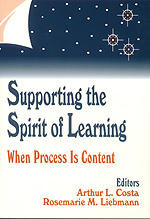Description
"How will the traditional skillset of the industrial era have to be expanded for successful workers and citizens in the knowledge era? How must the traditional education process be transformed? Two cornerstones to the new system of education will be elevating the learning process to comparable standing with the content of what is learned, and making high-level thinking and learning skills, like systems thinking and collaborative learning, as important as traditional skills of reductionistic thinking and individual problem solving. These could indeed be two elements of a 'thought revolution in education."
From the Foreword by Peter M. Senge, Center for Organizational Learning
Massachusetts Institute of Technology
Supporting the Spirit of Learning presents a powerful case for making the learning process the major focus of the curriculum. Curriculum-the heart and soul of teaching-has too often remained an overlooked component of school reform. The editors believe a new way of learning is necessary in order to develop the skills needed in today's interdependent world. This new framework encourages lifelong learning, systems thinking, and teamwork. Teaching specific disciplines reinforces the all-important teaching of processes and skills such as critical thinking, problem solving, and information processing. The chapter authors of this study describe how curriculum, evaluation and assessment, and involving parents and technology would be different if process and not content were the primary focus of learning.
Chapters explore the changes in preservice and inservice training needed to support process-centered education. The role of educator shifts from information provider to that of catalyst, coach, innovator, researcher, and collaborator with the learner throughout the learning process. Tomorrow's workplaces will require flexible, multiskilled, continuously learning employees.
To achieve that goal, process-based learning focuses on:
- Developing critical thinking skills
- Implementing self-assessment exercises, integral to learning
- Offering students opportunities to actively acquire knowledge for themselves
- Creating learning environments that develop cooperative problem solving
- Learning skills in the context of real problems
- Cultivating learner-centered, teacher-directed management
- Creating outcomes that ensure all students have learned to think
Written for school administrators, teachers, staff developers, curriculum staff, and the faculty of teacher preparation, Supporting the Spirit of Learning is the second volume of a trilogy addressing the curriculum needs for the 21st century.



